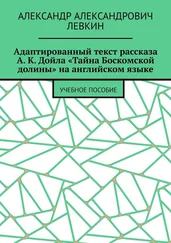| There is a strong presumption that the person whom McCarthy expected to meet him at Boscombe Pool was someone who had been in Australia." |
Это веское доказательство, что человек, которого Маккарти надеялся встретить у Боскомского омута, бывал в Австралии. |
| "What of the rat, then?" |
- Ну, а крыса? |
| Sherlock Holmes took a folded paper from his pocket and flattened it out on the table. |
Шерлок Холмс достал из кармана сложенный лист бумаги, расправил его на столе. |
| "This is a map of the Colony of Victoria," he said. |
- Это карта штата Виктория, - сказал он. |
| "I wired to Bristol for it last night." |
- Я телеграфировал прошлой ночью в Бристоль, чтобы мне ее прислали. |
| He put his hand over part of the map. |
- Он закрыл ладонью часть карты. |
| "What do you read?" |
- Прочтите, - попросил он. |
| "ARAT," I read. |
- АРЭТ A rat (а рэт) - по-английски значит "крыса", - прочитал я. |
| "And now?" |
- А теперь? |
| He raised his hand. |
- Он поднял руку. |
| "BALLARAT." |
- БАЛЛАРЭТ. |
| "Quite so. |
- Совершенно верно. |
| That was the word the man uttered, and of which his son only caught the last two syllables. |
Это и есть слово, произнесенное умирающим, но сын уловил только последние два слога. |
| He was trying to utter the name of his murderer. |
Он пытался назвать имя убийцы. |
| So and so, of Ballarat." |
Итак, Балларэт. |
| "It is wonderful!" I exclaimed. |
- Это потрясающе! - воскликнул я. |
| "It is obvious. |
- Это вне всяких сомнений. |
| And now, you see, I had narrowed the field down considerably. |
А теперь, как видите, круг сужается. |
| The possession of a grey garment was a third point which, granting the son's statement to be correct, was a certainty. |
Наличие у преступника серого одеяния было третьим пунктом. |
| We have come now out of mere vagueness to the definite conception of an Australian from Ballarat with a grey cloak." |
Исчезает полная неизвестность, и появляется некий австралиец из Балларэта в сером пальто. |
| "Certainly." |
- И в самом деле! |
| "And one who was at home in the district, for the pool can only be approached by the farm or by the estate, where strangers could hardly wander." |
- К тому же он местный житель, потому что возле омута, кроме фермы и усадьбы, ничего нет, и посторонний вряд ли забредет туда. |
| "Quite so." |
- Конечно. |
| "Then comes our expedition of to-day. |
- Затем наша сегодняшняя экспедиция. |
| By an examination of the ground I gained the trifling details which I gave to that imbecile Lestrade, as to the personality of the criminal." |
Исследуя почву, я обнаружил незначительные улики, о которых и рассказал этому тупоумному Лестрейду. Это касалось установления личности преступника. |
| "But how did you gain them?" |
- Но как вы их обнаружили? |
| "You know my method. |
- Вам известен мой метод. |
| It is founded upon the observation of trifles." |
Он базируется на сопоставлении всех незначительных улик. |
| "His height I know that you might roughly judge from the length of his stride. |
- О его росте вы, разумеется, могли приблизительно судить по длине шага. |
| His boots, too, might be told from their traces." |
О его обуви также можно было догадаться по следам. |
| "Yes, they were peculiar boots." |
- Да, это была необыкновенная обувь. |
| "But his lameness?" |
- А то, что он хромой? |
| "The impression of his right foot was always less distinct than his left. |
- Следы его правой ноги не так отчетливы, как следы левой. |
| He put less weight upon it. |
На правую ногу приходится меньше веса. |
| Why? |
Почему? |
| Because he limped-he was lame." |
Потому что он прихрамывал - он хромой. |
| "But his left-handedness." |
- А то, что он левша? |
| "You were yourself struck by the nature of the injury as recorded by the surgeon at the inquest. |
- Вы сами были поражены характером повреждений, описанных хирургом. |
| The blow was struck from immediately behind, and yet was upon the left side. |
Удар был внезапно нанесен сзади, но с левой стороны. |
| Now, how can that be unless it were by a left-handed man? |
Кто же это мог сделать, как не левша? |
| He had stood behind that tree during the interview between the father and son. |
Во время разговора отца с сыном он стоял за деревом. |
| He had even smoked there. |
Он даже курил там. |
| I found the ash of a cigar, which my special knowledge of tobacco ashes enables me to pronounce as an Indian cigar. |
Я нашел пепел и благодаря моему знанию различных сортов табака установил, что он курил индийскую сигару. |
| I have, as you know, devoted some attention to this, and written a little monograph on the ashes of 140 different varieties of pipe, cigar, and cigarette tobacco. |
Я, как вам известно, немного занимался этим вопросом и написал небольшую монографию о пепле ста сорока различных сортов трубочного, сигарного и папиросного табака. |
| Having found the ash, I then looked round and discovered the stump among the moss where he had tossed it. |
Обнаружив пепел сигары, я оглядел все вокруг и нашел место, куда он ее бросил. |
| It was an Indian cigar, of the variety which are rolled in Rotterdam." |
То была индийская сигара, изготовленная в Роттердаме. |
| "And the cigar-holder?" |
- А мундштук? |
| "I could see that the end had not been in his mouth. |
- Я увидел, что он не брал ее в рот. |
| Therefore he used a holder. |
Следовательно, он курит с мундштуком. |


